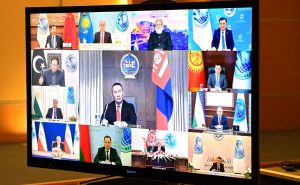Chinese leader Xi Jinping delivered a keynote speech via videolink at the meeting of the Council of Heads of State of the Shanghai Cooperation Organization (SCO) on Tuesday. His remarks called for the SCO to take on a more robust role in addressing transnational challenges with an emphasis on building communities of heath, security, development, and cultural exchange.
Ahead of the meeting, Vice Foreign Minister Le Yucheng previewed Xi’s message, saying that “China expects all sides to use the summit as an opportunity to strengthen the sense of community with a shared future, reach a new consensus on cooperation and formulate new cooperation measures, to inject strong impetus into achieving common development and rejuvenation.”
As is typically the case with SCO summit remarks, Xi offered aspirational messaging, peppered with a few tangible propositions. For example, Xi said “The SCO needs to expand its network of partnerships and conduct extensive cooperation with observers, dialogue partners, the UN and other international organizations. It should play a more active role in international and regional affairs, and stay committed to building an open, inclusive, clean and beautiful world that enjoys lasting peace, universal security and common prosperity.”
The most concrete announcement from Xi included suggestions the grouping could take to tackle the current coronavirus pandemic. He urged the members to expand exchanges of information on monitoring, research, and treatment, notably calling for the creation of hotline contacts between members to update one another on cross-border transmission of communicable diseases. He also highlighted China’s participation in a COVID-19 vaccine development, noting that the country would consider the SCO members’ needs for vaccines for public health.
The regional grouping gathered virtually against the backdrop of the ongoing spread of the coronavirus and concerns of a second wave, as well as still simmering tensions between two of the organization’s members, China and India. The meeting was chaired by Russia’s Vladimir Putin as part of Russia’s term as the organization’s rotating chairmanship; Tajikistan will serve as the organization’s next president. This week’s meeting was also attended by India’s Narendra Modi, Kazakhstan’s Kassym-Jomart Tokayev, Kyrgyzstan’s Sadyr Japarov, Pakistan’s Imran Khan, Tajikistan’s Emomali Rahmon, Uzbekistan’s Shavkat Mirziyoyev, as well as SCO Secretary-General Vladimir Norov and Director of the Executive Committee of the SCO Regional Anti-Terrorist Structure Jumakhon Giyosov. Heads from SCO observer member states including Afghanistan’s Ashraf Ghani, Belarus’ Roman Golovchenko, Iran’s Hassan Rouhani, and Mongolia’s Khaltmaagiin Battulga were also in attendance.
Despite the anticipated nods to solidarity and cooperation, there was no ignoring the elephant in the room as Xi and Modi met (albeit virtually) for the first time since border clashes erupted in May across their contested border. As The Diplomat’s Catherine Putz remarked in September after the foreign ministers meeting, “There’s something quite remarkable that two members of the SCO — this time China and India — could be experiencing such extreme tension in their bilateral relationship but still gather for the SCO. The SCO would likely say that’s the beauty of the Shanghai Spirit; the SCO’s critics would say it exposes, yet again, the organization’s overall impotence.”
While announcements like that of China’s proposal for a SCO hotline can be newsmakers, analysts are just as interested in what takes place on the sidelines of official gatherings. With the pandemic pushing diplomacy into the virtual space, however, sideline meetings between heads of state are shrouded in greater mystery. Still, Xi and Modi are both set to attend a flurry of diplomatic meetings this month, including the ASEAN Summit, the BRICS Summit, and the G-20 meeting. Other efforts are underway to reduce tensions and deescalate along the line of actual control between China and India. The respective foreign ministers held an extended in person meeting on the sideline of the SCO foreign ministers gathering in September and Beijing and New Delhi are reportedly working toward a disengagement plan but do not have a timeline in place for implementation.
Although the SCO started off nearly two decades ago as a mechanism to resolve borders among the initial members, its contemporary mission to promote regional security is largely focused on the conflict in Afghanistan and thwarting the spread of Islamic terrorism. India only recently joined the SCO, gaining full membership in 2017 along with its neighbor Pakistan. At the time, there were concerns that the ever-present India-Pakistan hostility would further hamstring the SCO’s mission of sustainable and cooperative regional security. The China-India standoff has only added to questions about the grouping’s efficiency.
“While the SCO may prove to be a zone of convergence, pulling the two back from the brink of conflict, current trends point in the opposite direction. As China deepens its relations with Russia and its ally Pakistan pushes to marginalize New Delhi’s role in the group, India looks set to remain the odd one out in the SCO,” writes Phunchok Stobdan, a former Indian ambassador to Kyrgyzstan and founder of the Ladakh International Center.
Xi’s calls for enhancing “good-neighborliness and friendship” between members may be difficult to take at face value amid an unresolved standoff with a neighbor and fellow SCO members.

































